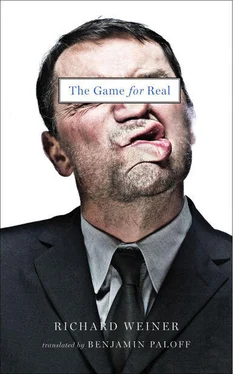Benedictine Mill and its ignominy, and the spiteful and insidious town, and the frenzied circuit closed the previous night by that monstrous and unadulterated calm: to be compensated with money for a loved one’s ugliness (how majestically foul this love is!) — what remains of ignominy, spitefulness, and frenzy if we know that we are under the protection of this eternally present, broody-looking attribute, next to this thing whose unwittingly evil eye no prank will cheer up, nor deflect from us? That’s how it is. Why say that it could just as well be some other way if — and who cares if it is — we’re the only ones who know, we and no one else, that now and then we maybe feel like something else? Perhaps something better? But if there’s no choice, then what’s worse, and what’s better? — “I’m unhappy” isn’t threatening, it’s not scary; it simply is, and it’s one of those rare things that doesn’t go sit somewhere else. How loyal it is, how self-sacrificing this inscrutable and indiscernible thing outside us is, to which we have no obligations. It answers for mistakes and blunders, it shields from wrongs, it assumes failures and shame upon itself. It’s the screen he is safe behind; and right away, again, the sacrificial lamb he redeems himself with; and right away, again, the confessor with absolution. That he’s despised by them? But out of ignorance! That he’s treated unfairly? But out of misunderstanding! That he’s unappreciated and deprived? What does it matter, so long as there’s this “I’m unhappy” of his, behind which and within which his innocence, his human worth, and his unrecognized right have found refuge? — “I’m unhappy” is broody, but not dismayed; poor, but tidy; weak, yet not cowardly. To him it imparted so suspiciously great a respect that he was awash in anxiety as to whether he might have started to love sinfully. He was seized with some puritanical fear that he might be flirting with incest.
They were alone; that is, he was alone. In the unifying whoosh of the express train, slavishly and proudly alone. The rest had already lent themselves out to each other; they deserved each other, they communicated, they understood each other. They understood, without talking it out, all the way to the point of collaborating on that circle with which they circumscribed the solitude they’d assigned to him. Each one did only a section, but it fit the sections entrusted to the others so precisely that a literal circle emerged, a circle in the middle of which were him and his exclusion and his “I’m unhappy,” which he looked in the eye with suspicious pride. It was a circle of the spontaneously formed and colloidally diffuse tale of his leprosy, it was the guard of the healthy against the plague. He knew this, he didn’t suffer for it; he asked his “I’m unhappy” questions; it answered him with a melancholic, yet encouraging, smile. He was alone, he was grieving, he was dejected but — no, he wasn’t dejected; “I’m unhappy” was a sanctuary. What more can we ask for if we have a refuge?
A jolly, corpulent gentleman was telling a story; he was dumping it onto the person sitting opposite him (again, the inspiring youth from the platform). He began intimately; his neighbor added the punctuation with guffaws that, though sparing and concisely courteous, were getting longer and taking on an infectious virulence. The storyteller didn’t take his eyes off them, he was sizing them up, and then, as though having judged that they had grown to a size worthy of a counterpoint, he encouraged them and himself, and the slapping of the neighbor’s thigh became more frequent and substantial. The express train, too, finally eased off its enthusiastic levitation; it landed and dashed now only with attenuated, hulking strides. — The private joke was slowly being made public, admiring itself, reveling in its increasing gravity. And suddenly — as if it had remembered that it was actually that tiny crystal in which a helpless supersaturated solution had found its purpose — the sundry laughs ran to and fro like crazy shuttles and wove a net that no one wanted out of. But despite its having been woven with a speed that was utterly insane, it was careful not to miss him . The entire compartment had been as though gathered into a corner, where the overstuffed words were gushing, along with the youthful laughter that had been patronizingly surrendered: a fairy-tale prince, too happy to shy away from a graceless woodsman’s joy. — He, the whole time alone with himself, he, the whole time sad and with a torturously senseless dignity, for he was boasting of something (and knew it) that hurt. He didn’t surrender, not even when they started to dance the belly laugh, whipping into the walls like a downpour onto a slapdash rooftop, a shower as well as steam, both water and its benefaction. –
And just then, a settling down: a sudden, swift, noise-pregnant silence. He looked up: the dancer had stretched out his hands, on the fingers of which — like puppet strings — was the travelers’ unbounded attention.
“He’s going to sing! Attention!”
And a solo, as notarially somber as hushed laughter:
“Dans le jardin de mon père. .”
The refrain and chorus buried the solo, as the masquerade procession buries the buffoon’s monologue.
“Auprès de ma blonde. .”
The refrain, a good-natured rascal, ruminated over what might be left of the individuals.
The people in this train compartment got along as no one had gotten along before, as no one would get along again: through words that were not the words of any of them.
And he suddenly understood that a great happiness had burst in here, that in which each would lose his trace, finding the trace of those similar to himself, and he is following it greedily.
His defiance broke into torrential relief: this is happiness! — Now he wanted it.
“Qu’il fait bon, fait bon, fait bon. .”
He joined in, he felt like a fish in water.
“Qu’il fait. .”
He shrieked into silence, into a silence ordered by the dancer’s outstretched hands.
“Hold on! That sounded off. . Who’s spoiling it?”
The eyes of the entire compartment are simultaneously upon him; halberdiers clearing the way; and behind them, the dancer’s finger, like the finger of a public prosecutor:
“It’s that gentleman there! Please, don’t spoil it for us. .”
The song rolled out again like a ball in a steep trough; if only it could know what it was rolling through!
He, however, cast a timid glance to the side, where his encouraging “I’m unhappy” had still been sitting a moment before. Something shabbily diaphanous was sitting there. It had long, groomed eyelashes over ashamedly downcast eyes. It had the attractive and sticky-sweet smile of the fine-looking man from yesterday. It was only now that this yesterday was making itself manifest in its hidden truth. It was like a morsel that he couldn’t get rid of, and that tasted like a purgative.
Boulevard Poissonnière is under the sovereignty of young men with lacquered hair, with manicured, slightly bar-blackened nails, with broad neckties under soft collars, with crumpled lapels, the responsibility for which falls to working girls taken to one-hour hotels; under the sovereignty of young men of the standard beauty of Languedoc brunettes resisted by just barely a fifth — statistics, please! — of the girls and boys they accost. — On Boulevard Poissonnière, there are marvelous shops with chic frocks — cotton garments whose finish weighs as much as the thing itself, with jewels for the most part cheaper than a single one of the light bulbs for their eye-catching illumination — public gramophone listening booths, vainglorious cafés with chicory coffee, half-blind display mirrors that go all the way out to the pavement.
Читать дальше












